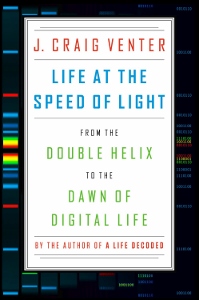Playing God? Or Not…
Author: J. Craig Venter
 Despite millennia of effort, the greatest minds in science, religion and philosophy have failed to deliver a convincing definition of life. While we may all think we pretty much know it when we see it, it can be remarkably hard to put into words. Is life just the summation of innumerable complex biochemical processes? Or is there some deeper process at play? Given a supply of basic building blocks, can we actually build life “from scratch”? Acclaimed molecular biology researcher, J. Craig Venter thinks that “synthetic” life is within our grasp and that this technology will have far reaching implications in humanity’s future. He writes about his initial forays into this contentious field in Life at the Speed of Light. Unfortunately, he provides much more haste than enlightenment.
Despite millennia of effort, the greatest minds in science, religion and philosophy have failed to deliver a convincing definition of life. While we may all think we pretty much know it when we see it, it can be remarkably hard to put into words. Is life just the summation of innumerable complex biochemical processes? Or is there some deeper process at play? Given a supply of basic building blocks, can we actually build life “from scratch”? Acclaimed molecular biology researcher, J. Craig Venter thinks that “synthetic” life is within our grasp and that this technology will have far reaching implications in humanity’s future. He writes about his initial forays into this contentious field in Life at the Speed of Light. Unfortunately, he provides much more haste than enlightenment.
Scientists have been transplanting foreign DNA into organisms for decades – prompting E. coli bacteria to manufacture the human insulin that diabetic patients use every day, for example – but could an organism’s entire genome be transplanted, in effect creating an entirely new organism? As one of the first scientists to sequence the complete human genome and a man who’s always looking for a big challenge, Venter was determined to be the first to do it. After revealing much of the history behind the field of molecular biology, Venter tells how he and his colleagues built a customized chromosome from Mycoplasma mycoides – a bacterial pathogen in ruminants – and transplanted it into a different Mycoplasma species, creating an entirely new life form. While it may seem like a rather trivial accomplishment, the technical challenges that were overcome to achieve this feat were quite formidable and Venter goes into frequently exhaustive detail.
He also touches on many of the ethical issues that arise whenever scientists start manipulating DNA and creating new forms of life. He bridles a bit at the idea that he’s “playing God” – after all farmers and dog breeders have been modifying species for millennia – but he does take the topic seriously and recognizes that his work can have significant ethical and public health implications.
Although I’m not an expert, it’s clear to me that Venter is a brilliant scientist and his scientific achievements are appropriately considered amazing and ground breaking. But that doesn’t mean he can write a book. His historical commentary is mostly a boring litany of Nobel Prize winners and when he starts writing about his research – hold on! – he slams the book into high gear, stomps on the gas and doesn’t let up for 178 pages of prose denser than iridium. Other than the requisite breaks between chapters, he doesn’t provide any moments for thought, contemplation, comic relief or even a single deep breath. Whenever I sat down to read for more than twenty minutes, my viscera would start to experience an agonizing literary bloat. Remarkably unpleasant.
Despite the fact that he frequently acknowledges the many contributions of his teammates and colleagues, ego is on almost every page. I don’t have a problem when accomplished and talented people think a lot of themselves, they should, but it’s pretty easy for those feelings to taint the reading experience, particularly when one’s literary style most closely resembles a robot on Red Bull.
All science and no art, Life at the Speed of Light is a consistently unpleasant read. It’s full of all sorts of remarkable science that in the hands of a more nuanced writer could be quite fascinating, however in this instance it’s nothing but a disappointment for this science nerd. Avoid it.
— D. Driftless
photo by Volkan Yuksel
- Best Non-Fiction of 2016 - February 1, 2017
- Little Free Library Series — Savannah - May 22, 2015
- Little Free Library Series — Wyoming - November 30, 2014




Leave A Comment